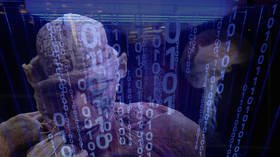Human brains outdated? 'Inventive’ AI making abstract art just filed for two PATENTS

A team of academics has filed two patents on behalf of an artificial intelligence program, which they say is the real brains behind their inventions. The development could disrupt intellectual property law the world over.
Known as the “device for the autonomous bootstrapping of unified sentience,” (DABUS), the system sits on the cutting edge of AI tech, capable of “inventive acts,” as well as what lowly organic lifeforms might call “creativity.”
After DABUS started inventing new products – designing a special interlocking food container easily grasped by industrial robots, and a unique emergency warning light – the system’s creator, Stephen Thaler, decided it was time to file for patents.
Also on rt.com ‘Algorithms don’t write themselves’: Google whistleblower on Big Tech merging with politicsUnfortunately for the ingenious machine, in the United States and across much of the world patents cannot be issued to non-human creators, an arrangement the team of academics called “outdated.”
Undeterred, Thaler joined up with a pair of law professors from the University of Surrey to file the patents in DABUS’s name, hoping to begin the process of overturning long standing intellectual property laws in the US, UK and Europe, instituted long before AI arrived on the scene.
“So with patents, a patent office might say, 'If you don't have someone who traditionally meets human-inventorship criteria, there is nothing you can get a patent on,” Ryan Abbot, one of the legal experts working to get DABUS credit for its inventions, told the BBC.
“In which case, if AI is going to be how we're inventing things in the future, the whole intellectual property system will fail to work,” Abbot added.
The legal experts suggest that AI systems be recognized as legitimate inventors by law, but say the AI’s own human creator should hold the patent itself.
Also on rt.com ‘Monkey controlled computer with his brain’: Musk reveals brain-reading Neuralink implantIn distinction to other AI and machine learning systems, DABUS is not programmed to solve specific problems, but instead devises its own solutions, replicating “what is traditionally considered the mental part of the inventive act,” Thaler said.
The system incorporates “noise” intoits neural networks in order to generate unique “ideas.”
Previously, the DABUS system was able to use that neural noise to recreate “mental instability” and produce novel works of surrealist art.
This artificial intelligence is designed to be mentally unstable https://t.co/mIGBwmxAUc#ArtificialIntelligence#AI#MachineLearning#dabus#tech#thaler#TechNews#MachineIntelligencepic.twitter.com/wlR4pAFJMd
— ShapeIT Recruitment (@shapeitrecruit) November 9, 2017
With computers threatening to overcome mankind’s own creative capacities, it is probable that some laws will have to change to make way for AI as it continues to march forward. Though the team’s legal challenge has just begun and raises a myriad complex questions that will take time to resolve, we may want to settle the issue sooner rather than later – or the machines might do it for us.
Think your friends would be interested? Share this story!













